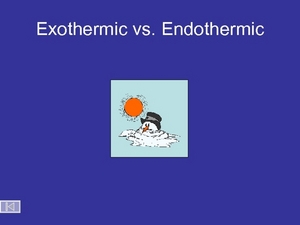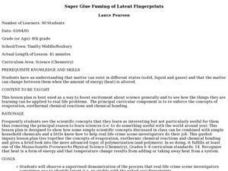Curated OER
Bouncing Balls
Students create a polymer to demonstrate its properties and develop an awareness of the wide variety of uses for polymers.
Curated OER
The Chemistry of Life
In this chemistry of life activity, students will review key terms of plant cell structure and chemistry by reading 13 clues to complete the puzzle. Word bank is included.
Curated OER
Water and Diffusion
In this water and diffusion activity, students will explore the characteristics of water and the water molecule. Students will also answer questions about diffusion and the movement of materials due to concentration differences. This...
Curated OER
Food Additives
In this food additives worksheet, students will read information about the use of curing salt and ion nitrates to preserve food and the health problems that can occur from using these substances. Students will then answer 4 short answer...
Curated OER
Chemistry and the Food System
In this chemistry activity, students review how chemistry has helped grow and preserve different foods. This activity has 11 fill in the blank, 3 multiple choice, and 6 short answer questions.
Curated OER
Comparing Properties of Elements & Compounds
In this elements and compounds worksheet, students review the physical properties of different compounds and elements using websites for information. This worksheet has 1 graphic organizer and 1 short answer question.
Curated OER
WHAT MAKES A LIGHT BULB LIGHT?
Young scholars are able to use inquiry to answer the essential questions. They are able to predict and test configurations of a battery, bulb, and wire that make the complete circuit. Students craft a group and individual theory of a...
Curated OER
Molecular Models of Functional Groups
In this molecular model worksheet, students use a molecular model kit to construct 13 different molecule models. After constructing the molecules, the students complete 32 short answer questions.
Curated OER
Periodic Table Basics Make-Up Test
In this periodic table worksheet, students complete a table of elements with their atomic number, atomic mass and symbol. They classify elements by their group name and distinguish between metals, nonmetals, and semi-metals. They also...
Curated OER
Organic Chemistry-Understanding Organic Reactions
For this organic reactions worksheet, high schoolers are given descriptions of the seven types of reaction of organic compounds. They then answer six questions about these reactions.
Curated OER
Properties of Matter (Biomaterial Through Nanotechnology)
Students investigate friction between different surfaces. In this physics lesson, students research biomaterials that can reduce friction. They calculate efficiency using a mathematical formula.
Curated OER
Periodic Table Basics Review Sheet
In this periodic table worksheet, students complete a chart with the appropriate element symbol, the atomic mass and the atomic number. They classify elements by their groups and as metals, nonmetals or semi-metals. They also answer two...
Curated OER
Lesson on Proteins
Students examine the importance of proteins including their function and structure. In this protein lesson students play a game to help them better understand proteins.
Curated OER
Magnetic Induction
In this electricity activity, learners learn about magnetic induction plus compare a generator with a motor. Students also review the different kinds of energy and the formulas associated with energy. This activity has 28 matching, 10...
Curated OER
Carbon Dioxide
Students conduct a series of experiments to explore carbon dioxide properties. In this chemistry lesson plan, students explain the production and uses of this gas. They measure its amount in soda and waste product of yeast.
Curated OER
The Influence of Carbon Dioxide on the Chemistry of Soda
Students investigate the carbon dioxide content of different sodas. In this chemistry lesson plan, students explain why PET containers are preferable than HDPE for soda bottles. They collect data and graph them.
Curated OER
Metals vs. Non-Metals
In this elements worksheet, students compare and contrast the characteristics of metals and non-metals. Students practice drawing Lewis dot diagrams and writing ion notation. This worksheet has 9 word problems, 8 matching questions, and...
Curated OER
AP Chemistry: Acid-Base Worksheet
In this acid-base activity, students solve multiple problems related to reactions of acids and bases. They determine pH of solutions, they find conjugate acids and bases, they calculate concentrations of acids and bases and they write...
Curated OER
Metals vs. Non-Metals: Dot Diagrams; Ions
In this metals, non-metals, dot diagrams and ions learning exercise, students read about each of these topics and they identify if 8 elements are metals or non-metals, they draw electron dot diagrams for 5 elements, they write the charge...
Curated OER
Mixtures, Solutions and Matter
In this mixtures, solutions and matter learning exercise, students are given 12 terms and they cut out 12 definitions to match with the terms. Topics include types of mixtures, types of matter such as atoms, molecules and compounds and...
Curated OER
Exothermic vs. Endothermic
The PowerPoint opens with video footage of the decomposition of nitrogen triiodide and then explains it with diagrams. Graphs of exothermic and endothermic reactions are exhibited, as well as one for the effect of a catalyst on reaction...
Curated OER
Doing Lewis Dot Diagrams
Students observe the periodic table and draw the Lewis Dot Diagram. In this investigative lesson students construct information on several elements including the Lewis Dot Formation and take a quiz on the information they learned.
Curated OER
DNA: Structure and Replication Movie
In this DNA: structure and replication instructional activity, students fill in the blanks about the structure of DNA and replication of DNA. Students sketch several diagrams of DNA at different stages.
Curated OER
Super Glue Fuming of Latent Fingerprints
Students explore latent fingerprinting. They observe a supervised demonstration of the process that real-life crime scene investigators sometimes use to identify latent fingerprints. In addition, they brainstorm ways to improve the...

























